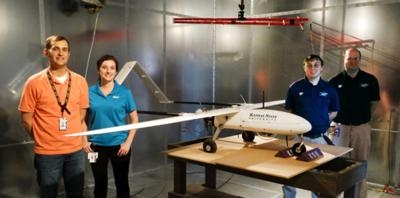Fri, Apr 17, 2015
Goal Is To Minimize Risk Of UAV Operations In The NAS
Two Kansas universities are working together with the FAA to minimize the risk associated with the operation of unmanned aerial systems (UAS) operating in the National Airspace System.

Recently Wichita State University's National Institute for Aviation Research (NIAR) and the Kansas State University Applied Aviation Research Center on the Salina campus conducted radiated susceptibility testing on a gasoline-powered, fixed-wing aircraft weighing 50 pounds with an 11-foot wingspan in a reverberation chamber at NIAR.
The radiated susceptibility testing was conducted to determine whether the aircraft's electronic systems will operate as intended when exposed to radio frequency, such as that emitted from broadcasting antennas and radio stations.
The tests are part of a larger effort by K-State Salina to validate the ASTM F38 Committee's standards for small unmanned aircraft systems.
"This partnership and subsequent research will achieve a broader understanding of the ASTM F38 requirements," said Tom Aldag, director of R&D for NIAR. "It will help us determine where the standard is overly restrictive and where there are gaps. The goal is to have a useful set of standards that benefits the UAS industry."
Wichita State is supporting K-State Salina in researching the environmental effects on UAS, especially in the areas of electromagnetic susceptibility, vibration and temperature variation. Together, they hope to achieve standardized test methods that the UAS industry can utilize in order to maintain public safety and well-being while benefiting from the wide range of applications and resources provided by UASs.
The project will conclude when required testing and evaluation has been completed and conclusions can be drawn about all applicable standards. The final project report will outline the project findings and include a gap analysis to show where the standards may have been insufficient to mitigate established operational risks. It will also include recommendations for changes to the standards that will close gaps where possible and allow for risk to be mitigated to a greater degree.
The tests were performed in NIAR's Environmental and Electromagnetic Test Labs, which will soon move to Air Capital Flight Line, formerly the site of the Boeing Company.
(Image provided by NIAR)
More News
Sikorsky UH-60 Black Hawk Helicopter Collided With An Unregistered DJI Mavic 3T Unmanned Aerial Vehicle On July 7, 2025, about 1557 central daylight time, an unregistered Sikorsky >[...]
“After considering the measures taken, minimum liquidity covenants in the Company's current debt obligations and cash flows to maintain current operational obligations requir>[...]
Ground Clutter A pattern produced on the radar scope by ground returns which may degrade other radar returns in the affected area. The effect of ground clutter is minimized by the >[...]
Aero Linx: Warbirds of America The EAA Warbirds of America, a division of the Experimental Aircraft Association in Oshkosh, Wisconsin, is a family of owners, pilots and enthusiasts>[...]
Also: Louisville UPS Crash Aftermath, Taiwan Boosts Pilot Pool, Spartan Acquires, DON’T MISS the MOSAIC Town Hall! This three-day Affordable Flying Expo brings together indoo>[...]
 NTSB Prelim: Sikorsky UH60 Sikorsky UH-60
NTSB Prelim: Sikorsky UH60 Sikorsky UH-60 Aero-News: Quote of the Day (11.13.25)
Aero-News: Quote of the Day (11.13.25) ANN's Daily Aero-Term (11.13.25): Ground Clutter
ANN's Daily Aero-Term (11.13.25): Ground Clutter ANN's Daily Aero-Linx (11.13.25)
ANN's Daily Aero-Linx (11.13.25) Airborne 11.07.25: Affordable Expo Starts!, Duffy Worries, Isaacman!
Airborne 11.07.25: Affordable Expo Starts!, Duffy Worries, Isaacman!



